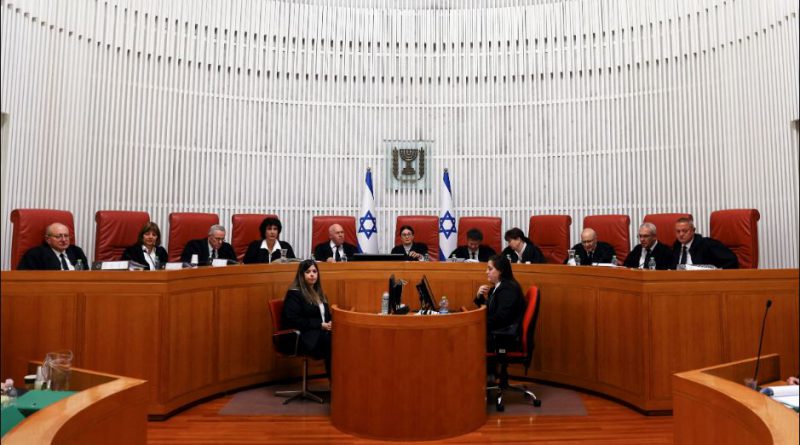Factbox: Netanyahu judicial overhaul faces showdown in Israeli Supreme Court
Jerusalem (Reuters) – Israel’s Supreme Court on Thursday hears the first in a series of appeals against actions by Prime Minister Benjamin Netanyahu and his coalition that go straight to the core of a judicial crisis that has rocked the country for months.
The appeals, by watchdog groups and opposition lawmakers, ask the court to rule against some of the judicial changes pursued by Netanyahu’s governing coalition that have sparked unprecedented protests.
Long feted as a torch-bearer for basic rights or scorned for elitist over-reach, the Supreme Court is under ever fiercer scrutiny.
Incapacity Amendment
The appeal to be heard on Thursday challenges an amendment to a “basic law” that sets limited conditions for a prime minister to be deemed unfit, or incapacitated, and removed from office. The attorney general has said that the Knesset, Israel’s parliament where the coalition has control, abused its authority by personally tailoring the law to suit Netanyahu, who is on trial for corruption he denies, and that therefore the amendment should be quashed. The law’s proponents say it is meant to safeguard any democratically elected leader from a wrongful ouster.
Reasonableness Clause
On Sept. 12, for the first time in Israeli history, the entire 15-judge Supreme Court bench will convene to hear an appeal against a basic law amendment that curbs its very own powers. The legislation, ratified on July 24, removes one, but not all, of the tools the court has for voiding government and cabinet ministers’ decisions or appointments. That tool empowers the court to rule an action is unreasonable. The legislation caused an uproar in Israel and drew immediate petitions to the court asking it be struck down for violating Israel’s democratic checks and balances. Netanyahu says it is a minor fix meant to restore balance between the branches of government by reining in a court that has become too interventionist.
constitution Quagmire
Both the incapacity and reasonableness amendments are part of basic laws that the court so far has refrained from quashing. Striking down a basic law or an amendment to one has been described in Israel as the Supreme Court using a legal doomsday weapon. It would likely exacerbate the present crisis. As Israel has no written constitution, it relies instead on these basic laws which enshrine some rights and liberties and establish rules of governance. Their stature exceeds those of regular laws. But basic laws can easily be added or amended by a majority in Israel’s unicameral parliament, largely dominated by coalition governments. For this reason, some legal experts say judicial oversight over basic laws is important for preventing abuses of power even if the precise scope of judicial review is ambiguous. Court critics see it as an intervention that would violate the legislature’s authority.
What Netanyahu Says
Netanyahu’s Likud party echoed its leader’s recent remarks in a July 31 statement: “Israeli governments have always respected the law and court rulings, and the court has always respected the basic laws. These two foundations form the basis of the rule of law in Israel and the balance between the authorities in any democracy. Any deviation from one of these principles will gravely harm Israeli democracy, which these days is in dire need of calm, dialogue and responsibility.”
More Appeals : Judges Panel
On Sept. 7 judges will hear a request to compel Justice Minister Yariv Levin to convene the committee which selects Israel’s judges. The panel has been at the heart of the battle over the judiciary since January when Levin announced the government’s judicial overhaul plan, including a change to the committee’s makeup that would give the governing coalition decisive sway over picking judges. Though a bill to that effect has been promoted in parliament, it has yet to be ratified. While the fate of the committee is unclear, bench vacancies are not being filled. From mid-October those vacancies will include the chief justice and another Supreme Court justice.
Netanyahu Removal
Another appeal sitting with the court but yet to be heard seeks the removal from office of Netanyahu, citing a conflict of interest due to his pursuit of judicial changes while he is on trial. Speculation is rife in Israel that Netanyahu is looking to have his indictment withdrawn through changes to the legal system. Netanyahu has denied any connection between his trial, which he has cast as a political witch hunt, and the reforms he seeks to the judiciary.



